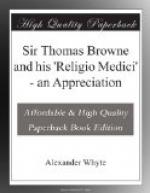* * * * *
The Religio Medici was Sir Thomas Browne’s first book, and it remains by far his best book. His other books acquire their value and take their rank just according to the degree of their ‘affinity’ to the Religio Medici. Sir Thomas Browne is at his best when he is most alone with himself. There is no subject that interests him so much as Sir Thomas Browne. And if you will forget yourself in Sir Thomas Browne, and in his conversations which he holds with himself, you will find a rare and an ever fresh delight in the Religio Medici. Sir Thomas is one of the greatest egotists of literature—to use a necessary but an unpopular and a misleading epithet. Hazlitt has it that there have only been but three perfect, absolute, and unapproached egotists in all literature—Cellini, Montaigne, and Wordsworth. But why that fine critic leaves out Sir Thomas Browne, I cannot understand or accept. I always turn to Sir Thomas Browne, far more than to either of Hazlitt’s canonised three, when I want to read what a great man has to tell me about himself: and in this case both a great and a good and a Christian man. And thus, whatever modification and adaptation may have been made in this masterpiece of his, in view of its publication, and after it was first published, the original essence, most genuine substance, and unique style of the book were all intended for its author’s peculiar heart and private eye alone. And thus it is that we have a work of a simplicity and a sincerity that would have been impossible had its author in any part of his book sat down to compose for the public. Sir Thomas Browne lived so much within himself, that he was both secret writer and sole reader to himself. His great book is ‘a private exercise directed solely,’ as he himself says, ’to himself: it is a memorial addressed to himself rather than an example or a rule directed to any other man.’ And it is only he who opens the Religio Medici honestly and easily believing that, and glad to have such a secret and sincere and devout book in his hand,—it is only he who will truly enjoy the book, and who will gather the same gain out of it that its author enjoyed and gained out of it himself. In short, the properly prepared and absolutely ingenuous reader of the Religio Medici must be a second Thomas Browne himself.
‘I am a medical man,’ says Sir Thomas, in introducing himself to us, ’and this is my religion. I am a physician, and this is my faith, and my morals, and my whole true and proper life. The scandal of my profession, the natural course of my studies, and the indifference of my behaviour and discourse in matters of religion, might persuade the world that I had no religion at all. And yet, in despite of all that, I dare, without usurpation, assume the honourable style of a Christian.’ And if ever any man was a truly catholic Christian, it was surely Sir Thomas Browne. He does not




